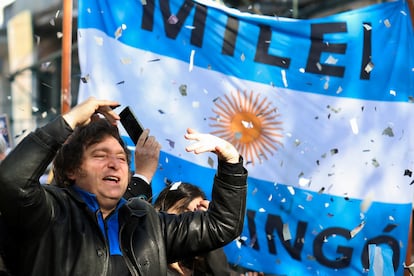Latin America: an election for every palate
The first round of voting in Argentina’s presidential race in late October is buzzing with online conversation largely dominated by far-right candidate Javier Milei

This month, Latin America is poised to experience four elections that capture the diverse moods and pressing challenges of the region. The presidential elections in Argentina on October 22 will likely draw the most attention, with far-right candidate Javier Milei stirring up a social media feeding frenzy. Ecuador will hold a second and final election amid a security crisis, while Colombians will elect mayors and governors on October 29. Lastly, Venezuelans will choose an opposition leader to run against President Nicolás Maduro, if the ruling Chavista regime allows it.
Very interesting talk that goes far beyond Argentina in subjects discussed https://t.co/cUKZtSitfk
— Elon Musk (@elonmusk) September 17, 2023
Milei is an economist and the top vote-getter in the August primaries who wants to dollarize Argentina’s economy and legalize and regulate the human organ trade. This caught the attention of X owner (formerly Twitter) Elon Musk, who reposted an interview of Milei by Tucker Carlson, the former Fox News star. “Very interesting talk that goes far beyond Argentina in subjects discussed,” wrote Musk. In the interview, Milei seized hold of the concept of freedom, stretching it like a piece of bubblegum before concluding with his paradoxical catchphrase: “Long live freedom, damn it.”
Milei’s mission to eradicate Peronism once and for all has put the traditional right wing, represented by Patricia Bullrich, in a difficult position. He claims to be “the only person who has truly confronted Kirchnerism in the last 20 years.” Nestor and Cristina Kirchner, a husband and wife political duo in the Peronist movement, each served as president of Argentina. Meanwhile, Sergio Massa, the candidate from the ruling party, is taking advantage of his position as Minister of Economy by launching new public works projects with much fanfare in a country struggling with high inflation and rising poverty.
While everyone is fretting about the prospect of Javier Milei becoming president in Argentina, Ecuador is facing its own set of challenges. The first round of elections was roiled by a serious spike in violence that peaked with the assassination of presidential candidate Fernando Villavicencio by organized crime figures. Public safety has become the focal point of every contender’s campaign. Backed by former president Rafael Correa, Luisa González has promised to tackle the security issue by declaring a state of emergency that aims to regain control of streets and prisons, and combat drug trafficking. Meanwhile, Daniel Noboa, son of billionaire Álvaro Noboa, recently released a CSI: Miami-style video to present his crime-fighting plan.
It’s a different sort of fight in Venezuela, where Maduro’s opposition has scheduled primaries on October 22 to select their candidate for the 2024 presidential elections. Conservative María Corina Machado is currently leading in the polls, followed by another veteran politician, Henrique Capriles. However, both candidates have been disqualified from running by the new National Electoral Council (CNE), chaired by the same government official who called for their disqualifications. This murky situation has jeopardized the entire primary process and raises concerns about the fairness of the upcoming presidential elections.
Colombians are set to vote this month in midterm elections to elect mayors and governors at a time when President Gustavo Petro’s left-wing coalition is facing numerous challenges. Polls indicate that Carlos Fernando Galán, the New Liberalism candidate and son of Luis Carlos Galán, is likely to become mayor of Bogotá, despite an intense burst of campaign rallies and outreach by his rivals. Luis Carlos Galán was assassinated in 1989 during his presidential campaign.
Sign up for our weekly newsletter to get more English-language news coverage from EL PAÍS USA Edition
Tu suscripción se está usando en otro dispositivo
¿Quieres añadir otro usuario a tu suscripción?
Si continúas leyendo en este dispositivo, no se podrá leer en el otro.
FlechaTu suscripción se está usando en otro dispositivo y solo puedes acceder a EL PAÍS desde un dispositivo a la vez.
Si quieres compartir tu cuenta, cambia tu suscripción a la modalidad Premium, así podrás añadir otro usuario. Cada uno accederá con su propia cuenta de email, lo que os permitirá personalizar vuestra experiencia en EL PAÍS.
¿Tienes una suscripción de empresa? Accede aquí para contratar más cuentas.
En el caso de no saber quién está usando tu cuenta, te recomendamos cambiar tu contraseña aquí.
Si decides continuar compartiendo tu cuenta, este mensaje se mostrará en tu dispositivo y en el de la otra persona que está usando tu cuenta de forma indefinida, afectando a tu experiencia de lectura. Puedes consultar aquí los términos y condiciones de la suscripción digital.









































